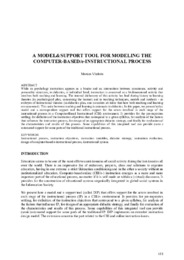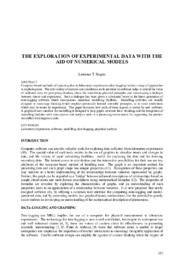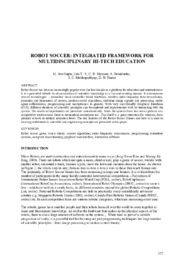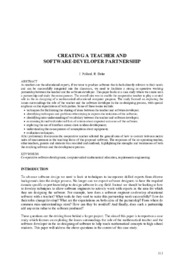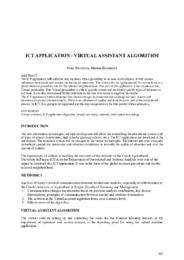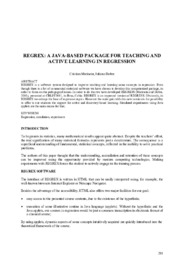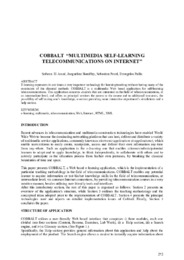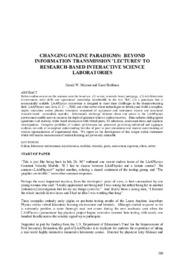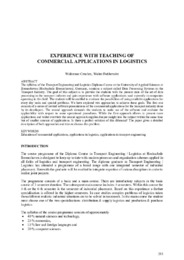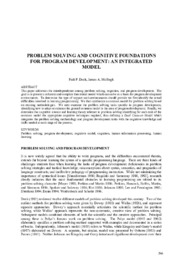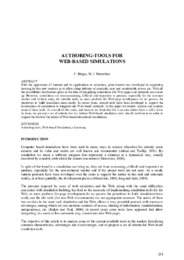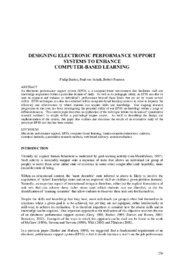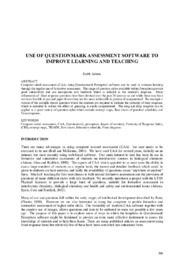Συνέδρια - Conferences: Recent submissions
Now showing items 161-180 of 502
-
A model & support tool for modeling the computer-based/e-instructional process
(Department of Educational Sciences, University of Cyprus, 2003)While in psychology instruction appears as a binder and an intersection between conscience, activity and personality structures, in didactics, at individual level, instruction is conceived as a bi-dimensional activity that ... -
The exploration of experimental data with the aid of numerical models
(Department of Educational Sciences, University of Cyprus, 2003)Computer-based methods of capturing data in laboratory experiments (data-logging) invite a range of approaches to exploring data. The rich variety of analysis and calculation tools provided in software helps to extend the ... -
Solving some physical problems using the methods of numerical mathematics with the help of system mathematica
(Department of Educational Sciences, University of Cyprus, 2003)Every future teacher of mathematics must know symbolic approaches, for example, for finding derivations and integrals, solving algebraic and differential equations very well. But most of the problems from practice are not ... -
Robot soccer: integrated framework for Multidisciplinary hi-tech education
(Department of Educational Sciences, University of Cyprus, 2003)Robot Soccer has become increasingly popular over the last decade as a platform for education and entertainment. It is a powerful vehicle for dissemination of scientific knowledge in a fun and exciting manner. It encompasses ... -
Creating a teacher and software-developer partnership
(Department of Educational Sciences, University of Cyprus, 2003)As teachers are the educational experts, if we want to produce software that is both directly relevant to their needs and can be successfully integrated into the classroom, we need to facilitate a strong co-operative working ... -
ICT application - virtual assistant algorithm
(Department of Educational Sciences, University of Cyprus, 2003)The ICT application will cultivate new methods, with a possibility to be used in all subjects. It will contain influences from inside and outside the faculty or university. The scheme for the application ICT is in the form ... -
Information and communication technology; First-aid to the private tutoring problem?
(Department of Educational Sciences, University of Cyprus, 2003)In the past pupils at the elementary and high schools were only complaining about homework. Nowadays they must be rightfully complaining about private tutoring. Private tutoring has been seen by many as the plague of our ... -
Integrating information and communication Technology into teaching and learning - a Second level course for prospective teachers
(Department of Educational Sciences, University of Cyprus, 2003)Commonly, introductory-level courses on Information and Communication Technology (ICT) for prospective teachers focus on the development of knowledge and skill with the use of technology tools. These types of courses are ... -
Regrex: a java-based package for teaching and active learning in regression
(Department of Educational Sciences, University of Cyprus, 2003)REGREX is a software system designed to improve teaching and learning some concepts in regression. Even though there is a lot of commercial statistical software we have chosen to develop this computerized package, in order ... -
Cobbalt “multimedia self-learning telecommunications on internet”
(Department of Educational Sciences, University of Cyprus, 2003)E-learning represents in our times a very important technology for learning/teaching without having many of the constraints of the classical methods. COBBALT is a multimedia Web based application for self-learning ... -
Graphical representation of data: the effect of the use of dynamical statistics technological tool
(Department of Educational Sciences, University of Cyprus, 2003)In response to calls for reform an innovative course which has at its core element a dynamical statistical software package, Fathom, was developed as an alternative approach to traditional introductory statistics in college. ... -
Changing online paradigms: beyond Information transmission 'lectures' to research-based interactive science laboratories
(Department of Educational Sciences, University of Cyprus, 2003)Robust online courses in the sciences must be based on: (1) sound, research–based pedagogy, (2) rich laboratory environments with skills and operational knowledge transferable to the wet ‘lab’, (3) a paradigm that is ... -
Experience with teaching of commercial applications in logistics
(Department of Educational Sciences, University of Cyprus, 2003)The syllabus of the Transport Engineering and Logistics Diploma Course at the University of Applied Sciences at Bremerhaven (Hochschule Bremerhaven), Germany, contains a subject called Data Processing Systems in the Transport ... -
Hilbert: an autonomous evolutionary information system for teaching and learning logic
(Department of Educational Sciences, University of Cyprus, 2003)In order to establish a widely useful computer-based environment for teaching and learning logic, we are developing an autonomous evolutionary information system, named “HILBERT,” for teaching and learning various logic ... -
Problem solving and cognitive foundations for program development: an integrated model
(Department of Educational Sciences, University of Cyprus, 2003)This paper addresses the interdependence among problem solving, cognition, and program development. The goal is to present a coherent and complete theoretical model which can serve as a basis for program development ... -
Authoring-tools for web-based simulations
(Department of Educational Sciences, University of Cyprus, 2003)With the appearance of Internet and its applications to education, great interest was developed in supporting learning by this new medium as it offers cheap delivery of materials, easy and comfortable access, etc. With ... -
A tool to support interaction and collaboration analysis of learning activities
(Department of Educational Sciences, University of Cyprus, 2003)An increasing amount of data is collected today during studies in which students and educators are engaged in learning activities using information technology and other tools. These data are indispensable for analysis ... -
Designing electronic performance support systems to enhance computer-based learning
(Department of Educational Sciences, University of Cyprus, 2003)An electronic performance support system (EPSS) is a computer-based environment that facilitates skill and knowledge acquisition within a particular domain of study. As well as its pedagogic utility, an EPSS can also be ... -
Use of questionmark assessment software to improve learning and teaching
(Department of Educational Sciences, University of Cyprus, 2003)Computer aided assessment (CAA) using Questionmark Perception software can be used to enhance learning through the regular use of formative assessment. The range of question styles available within Perception provide good ... -
Internet facilities for virtual and hands-on educational experiments
(Department of Educational Sciences, University of Cyprus, 2003)Real time computer simulators of the standard educational Physics laboratory works were designed in VRML and Java for distant learning and self-studies of University students. Experimental schemes and software were developed ...
